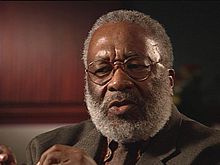Vincent Harding
Vincent Gordon Harding (born July 25, 1931 in New York City , † May 19, 2014 in Philadelphia , Pennsylvania ) was an American historian and publicist . Harding is best known as a civil rights activist and supporter of Martin Luther King .
life and work
Harding was born in Harlem , New York , in July 1931 . His parents were immigrants from Barbados , but they separated early on, so that Harding grew up alone with his mother. After graduating from high school, Harding earned a bachelor's degree in history from City College of New York and then a master's in journalism from Columbia University . Between 1953 and 1955 he served in the US Army , but took an increasingly critical position on the military. In 1956 he graduated from the University of Chicago with a Masters degree in history . During his studies he came into contact with the writings of the radical Reformation Anabaptists and subsequently turned theologically to the pacifist Mennonites , where he was also ordained as a pastor. He had previously been a member of the Seventh-day Adventists . Through the Mennonites in Chicago he also met his future wife Rosemarie Feeney, whom he married on August 7, 1960. In 1960, Harding and his wife moved to Atlanta , Georgia , where he co-founded a Mennonite meeting place (Mennonite House). Five years later, Harding received a PhD in history from the University of Chicago and subsequently found employment at Atlanta's Spelman College. At that time, Harding and his wife were already active in the American civil rights movement . Harding was involved in the Southern Christian Leadership Conference , the Student Nonviolent Coordinating Committee and the Congress of Racial Equality , among others . A central theme of the civil rights movement at the time was the fight against American racial segregation , later work against the Vietnam War moved to the center. Through his activities in the civil rights movement, Harding came into contact with Martin Luther King, for whom he wrote several speeches such as the anti-Vietnam War speech of April 4, 1967. After the assassination of Martin Luther King, Harding worked with King's wife Coretta Scott King to set up the Martin Luther King Memorial Center in Atlanta, of which he was the first director until 1970. Harding then taught at Temple University and the University of Pennsylvania , worked as a publicist and writer and worked as a consultant for the American documentary series Eyes on the Prize . From 1981 to 2004 he was Professor of Religion and Social Transformation at the Iliff School of Theology in Denver , Colorado , where he and his wife founded the Veterans of Hope Project , an educational initiative that is still dedicated to worldwide nonviolent resistance. After the death of his first wife, Harding married Aljosie Aldrich in December 2004, with whom he had a daughter and a son.
Harding died on May 19, 2014 in Philadelphia, Pennsylvania at the age of 82. Harding is best known as a civil rights activist, critic of the Vietnam War and speechwriter for Martin Luther King. As a publicist, he wrote several essays and books. As a representative of non-violent resistance, he had a direct influence on the sociologist Howard Zehr and the development of restorative justice as a form of conflict management and the victim-offender settlement .
Fonts (selection)
- The Other American Revolution, Center for Afro-American Studies (University of California), 1980
- There Is a River: The Black Struggle for Freedom in America, Harcourt Brace Jovanovich, 1981
- Hope and History: Why We Must Share the Story of the Movement, Orbis Books, 1990
- Martin Luther King, the Inconvenient Hero, Orbis Books, 1996
- African-American Christianity: Essays in History
- We Must Keep Going: Martin Luther King and the Future of America
- There Is a River: The Black Struggle for Freedom in America, New York, 1981
- Beyond Chaos: Black History and the Search for the New Land, Institute of the Black World, 1970
Web links
- Veterans of Hope Project , initiative founded by Harding
- Literature by and about Vincent Harding in the WorldCat bibliographic database
swell
- Encyclopædia Britannica: Vincent Gordon Harding, American civil rights activist and historian
- BlackPast.org: Harding, Vincent Gordon (1931-2014)
- New York Times: Vincent Harding, 82, Civil Rights Author and Associate of Dr. King, This
- The Washington Post: Vincent Harding, author of Martin Luther King Jr.'s antiwar speech, dies May 22, 2014
- The Mennonite: Vincent Harding: 'Don't get weary though the way be long'
| personal data | |
|---|---|
| SURNAME | Harding, Vincent |
| ALTERNATIVE NAMES | Harding, Vincent Gordon |
| BRIEF DESCRIPTION | American historian and civil rights activist |
| DATE OF BIRTH | July 25, 1931 |
| PLACE OF BIRTH | New York City |
| DATE OF DEATH | 19th May 2014 |
| Place of death | Philadelphia , Pennsylvania |
